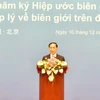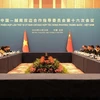More foreign stock investors have recently flocked to Vietnam, most coming from Japan, China, the Republic of Korea and the newest ones from regional countries such as Singapore, Thailand, and Malaysia.
By the end of 2009, foreign stock investors had opened over 10,000 bank accounts, of which 1,000 belonged to investment companies and organisations.
According to Thanh Nien daily issued on Feb. 3, securities experts forecast that more foreign investors would come to the Vietnamese stock exchanges in the coming time.
To serve those investors, many securities companies, including SSI, Bao Viet, ACBS, FPTS and Kim Eng, have employed more brokers who are fluent in foreign languages, especially the Japanese and Chinese languages.
The Kim Eng Securities Company, for example, opened its Cho Lon branch in Ho Chi Minh City to cater to the Hoa (Chinese) ethnic people in the city.
Meanwhile, the SSI has established a brokerage department exclusively serving foreign investors.
However, the Director General of the Dragon Capital, Dominic Scriven, said the biggest hurdles to foreign investors are the percentage of stock codes that foreign investors are allowed to own in line with Vietnam ’s laws, and the unqualified governance systems of a number of companies listed on the bourse.
He also pointed to the use of the Vietnamese language to report on the performance of listed companies as causing difficulties for foreign stock investors.
At a seminar on “Vietnam’s capital and financial market” in Hanoi in late November, 2009, Vice President of the State Securities Commission Nguyen Doan Hung said a series of policies have been considered for changes to attract more foreign investors to the country’s stock market.
Those changes may include raising the ceiling on foreign total ownership of stocks by foreign investors for all listed companies to 49 percent from 30 percent and streamlining registration procedures for foreign investors applying for business codes./.
By the end of 2009, foreign stock investors had opened over 10,000 bank accounts, of which 1,000 belonged to investment companies and organisations.
According to Thanh Nien daily issued on Feb. 3, securities experts forecast that more foreign investors would come to the Vietnamese stock exchanges in the coming time.
To serve those investors, many securities companies, including SSI, Bao Viet, ACBS, FPTS and Kim Eng, have employed more brokers who are fluent in foreign languages, especially the Japanese and Chinese languages.
The Kim Eng Securities Company, for example, opened its Cho Lon branch in Ho Chi Minh City to cater to the Hoa (Chinese) ethnic people in the city.
Meanwhile, the SSI has established a brokerage department exclusively serving foreign investors.
However, the Director General of the Dragon Capital, Dominic Scriven, said the biggest hurdles to foreign investors are the percentage of stock codes that foreign investors are allowed to own in line with Vietnam ’s laws, and the unqualified governance systems of a number of companies listed on the bourse.
He also pointed to the use of the Vietnamese language to report on the performance of listed companies as causing difficulties for foreign stock investors.
At a seminar on “Vietnam’s capital and financial market” in Hanoi in late November, 2009, Vice President of the State Securities Commission Nguyen Doan Hung said a series of policies have been considered for changes to attract more foreign investors to the country’s stock market.
Those changes may include raising the ceiling on foreign total ownership of stocks by foreign investors for all listed companies to 49 percent from 30 percent and streamlining registration procedures for foreign investors applying for business codes./.



















